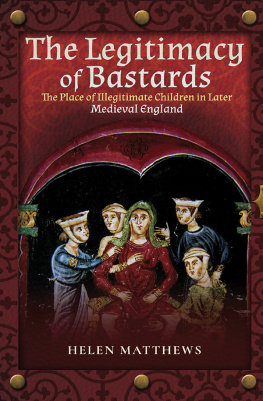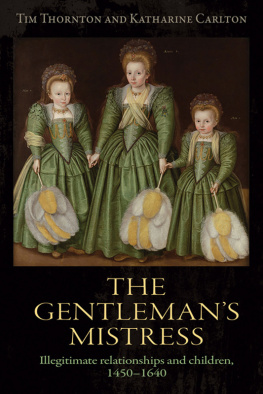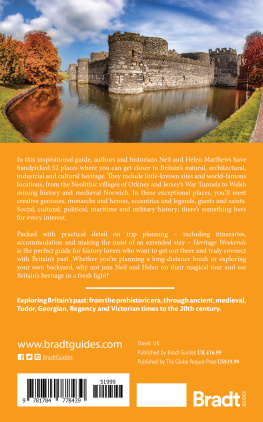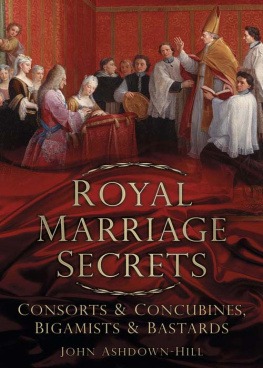The LEGITIMACY of BASTARDS
The LEGITIMACY of BASTARDS
The Place of Illegitimate Children in Later Medieval England
HELEN MATTHEWS
First published in Great Britain in 2019 by
PEN AND SWORD History
An imprint of
Pen & Sword Books Ltd
Yorkshire Philadelphia
Copyright Helen Matthews, 2019
Hardback ISBN: 9781526716576
Paperback ISBN: 9781526757623
Mobi ISBN: 9781526716569
The right of Helen Matthews to be identified as Author of
this work has been asserted by her in accordance with the
Copyright, Designs and
Patents Act 1988.
A CIP catalogue record for this book is available from the British Library.
All rights reserved. No part of this book may be reproduced or transmitted in any
form or by any means, electronic or mechanical including photocopying, recording
or by any information storage and retrieval system, without permission from the
Publisher in writing.
Pen & Sword Books Ltd incorporates the Imprints of Pen & Sword Books
Archaeology, Atlas, Aviation, Battleground, Discovery, Family History, History,
Maritime, Military, Naval, Politics, Railways, Select, Transport, True Crime, Fiction,
Frontline Books, Leo Cooper, Praetorian Press, Seaforth Publishing, Wharncliffe and
White Owl.
For a complete list of Pen & Sword titles please contact
PEN & SWORD BOOKS LIMITED
47 Church Street, Barnsley, South Yorkshire, S70 2AS, England
E-mail:
Website: www.pen-and-sword.co.uk
Or
PEN AND SWORD BOOKS
1950 Lawrence Rd, Havertown, PA 19083, USA
E-mail:
Website: www.penandswordbooks.com
Acknowledgements
I am indebted to the staff of the National Archives and various local record offices for their assistance, and also to the many individuals who been involved in the digitization of primary and secondary texts, many of which have become available since I first started researching medieval bastards.
I would like to thank my PhD supervisor, Professor Nigel Saul, for providing the initial inspiration for this project and for his support and guidance throughout my research. I would also like to thank Mr David Morgan, Professor David dAvray, Dr Nigel Ramsay and Bridget Wells-Furby for their advice at various stages of my research. Any errors are of course my own.
I would also like to thank Danna Messer and Claire Hopkins at Pen & Sword for giving me the opportunity to write this book.
Most of all I would like to thank my husband, Neil, for his encouragement and many cups of tea.
Foreword
I f asked to name a life-changing book few people are likely to suggest Scenes from Provincial Life , Nigels Sauls study of the Sussex gentry, but I can honestly say that it really did change my life. I was wondering what I might write my Masters dissertation about when I came across the following footnote: Reviewing S. M. Wright, The Derbyshire Gentry in the Fifteenth Century , Colin Richmond asks, Would my impression that virtually every Derbyshire gentleman had a mistress and bastards be substantiated? ( Medieval Prosopography 6 (1985) 121). If the Sussex evidence is anything to go by, the answer is yes.
This seemed to me to be both a hypothesis in need of further testing and a challenge I could not resist. One thing led to another and many years and a PhD later, I may not be able to agree that every English gentleman had a mistress and bastards, but many of them certainly did. Along the way, I have learned a lot about how the medieval landed classes managed their estates, their families and their sex lives.
When I first started researching the topic, it was necessary to spend weeks and months in libraries, ploughing through dusty tomes (some of them even with their pages still uncut), in order to find clues to illegitimate children. This is much easier now as more and more research resources are digitized and it is easier to make connections. Many more examples of bastards will surely be uncovered over time. This book is not and cannot be a comprehensive study of bastards in late medieval England, but it is an introduction to what I have found to be a fascinating subject that brings the medieval world to life.
*There are no footnotes/endnotes for this book.
Helen Matthews
April 2019
Introduction
I n January 1236 a Great Council was held at Merton Priory in Surrey. One of the items of discussion was a request from the bishops that children born before the marriage of their parents be treated as legitimate by English law, just as they were according to the canon law of the Church. The assembled barons were having none of it. Nolumus mutare leges Angliae (we do not wish to change the laws of England), they replied and the law remained unchanged for almost 700 years. It was not until the Legitimacy Act of 1926 that English law allowed the legitimation of children following the marriage of their parents, provided that neither parent had been married to someone else at the time of the birth. Were the barons particularly concerned about the law relating to legitimacy? Perhaps not. The attitude of the landed classes towards illegitimate children over the following three centuries suggests that pragmatism, rather than principle, was the defining approach. They may have been voicing more general concerns about foreign influences in the realm, given that a power struggle between native magnates and those they saw as foreign interlopers was a defining feature of the long reign of Henry III (121672). From the perspective of the second decade of the twenty-first century this desire to maintain the distinctiveness of English law in the face of interference from a supranational organisation based on the Continent may seem strangely familiar.
Whilst it would obviously be anachronistic to view the political tensions of the thirteenth century as a form of proto-Brexit, illegitimacy is a subject which allows us to explore contrasts and similarities in attitudes between the medieval world and our own. There are obvious differences: modern science has made it possible to determine biological parentage accurately via DNA testing, whereas in the medieval period a simpler approach was needed. In general terms, the test for legitimacy in English law was simply whether or not the mother was married. Whether she was married to the biological father of the child was rather more difficult to prove and, except in very limited circumstances, the law did not unduly concern itself with this distinction. In terms of social attitudes, however, there are perhaps greater similarities between the medieval world and the twenty-first century than the intervening period between the sixteenth and twentieth centuries, during which illegitimacy carried a greater social stigma. During the sixteenth century, the introduction of the Poor Law, making parishes responsible for the costs of unwanted children, together with the activities of religious reformers combined to harden attitudes towards sexual misconduct and illegitimate children.










